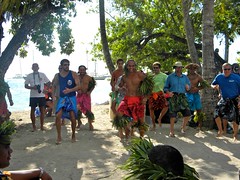The homeschool community routinely faces the question of socialization. Boat schoolers must address this issue to an even greater extent. How can we explain to land-based folk just how well socialized our children have become? Our children learn to play with kids of all ages, become instant play mates, enjoy the presence and company of adults. They can talk with anyone, share games and ideas regardless of age, race, or country of origin. Why did it not occur to me until tonight that the same processes that make my girls so capable -- such confident, well-spoken young people -- worked their magic on DrC and I as well?
Tonight as I watch Evan and Diane slip easily and comfortably into a group of Don Quixote's New Zealand friends, I recognize another truism of cruisers: We do well with strangers. Cruisers quite literally drift in and out of each others lives. We meet each other in one anchorage, have a dinner and sundowners, maybe go on a hike, and then we depart in different directions. It is a survival skill to become amiable, to take genuine interest in the lives of people known for less than a day. We learn how to be entertaining ourselves and in turn be diverted by newness, friendly and comfortable in a crowd of people formed of varying social strata, education, political or religious ideology. This isn't the artificial amiability of the politician, but rather a sincere adaptation to a transient social environment.
Just look at my husband. I remember the night years ago in Seattle when my good friend Wyatt looked at me over a glass of red and admitted, "I've known you for a long time. It's only now I think I understand why you married Dean." It took years for my husband to open up enough to let Wyatt know him, to reveal to someone outside our family the deeply sensitive, strong, and giving person inside. DrC has a wicked sense of humor, a keen and insightful intellect, and a wide ranging interest in the world. He is articulate, well read, and very current in his understanding of politics, economics, and society. But back in the day -- in those days before we become cruisers -- I was one of the only people in the world who knew this. He was shy, quiet, extremely private. At parties, he would functionally disappear, particularly in the presence of my loud, widely gesticulating, opinionated self. It was partially my fault, as I was unfortunately the obnoxious bore who would talk way too much, way too loudly, and with rarely a pause to listen. It was partially his fault, as he was a man who listened intently but almost never participated in the conversation.
Yet, here we are. I am settled on the couch listening to Deb tell me all about her broken leg. Moreover, I genuinely am interested; I am not just waiting until she takes a breath before I start in about me-me-me. Her story is actually a bit horrifying, a nasty break with lots of fits and starts in the healing process and the plot includes a great deal of morphine. My participation consists of a skill I learned from my husband, active and engaged listening, comments injected only to spur more revelations from Deb. It is such a pleasure to sit, sip my wine and listen to her voice, take inspiration from her strength both physical and emotional. In turn, DrC is actively engaged across the room sharing ideas about some dang thing with a man I know he's known for all of a half hour. His arms are waving, and he laughs at a comment while maintaining a running stream of dialog. We haven't switched places. I'm not silent, he's not loud and overwhelming, but we are also not the same people. Evan and Mark are sitting on the couch chatting about the performance characteristics of some old schooner Mark used to crew. Diane is giving Steve ideas how to get started in the travel writing business. My cruising friends have slipped seamlessly, effortlessly into this crowd of strangers. All four of us appear to be enjoying ourselves, and perhaps just as importantly give every appearance of providing interest, pleasure and mutual entertainment to the people with whom we interact.
"What about socialization?" The They of the world always ask.
"You mean ours, don't you?" I will now respond. DrC and I have finally completed our socialization, and for damn sure we didn't learn it in school. While DrC and I were out with our daughters on quiet anchorages and busy little port towns, our girls showed us what it means to be well socialized, highly functional members of society. I finally feel like a grown up.

Don Quixote and Ceilydh
by Toastfloats on Flickr


2 comments:
You guys are the best hosts--had a wonderful time. So wonderful we barely left:)
Heal quickly and see you soon.
-d
What a great post! I love reading your thoughts about boatschooling/socialization vs. "The They of the world". Even now at 27 I still get that extra-long look when it comes up that I was homeschooled until high school.
Post a Comment